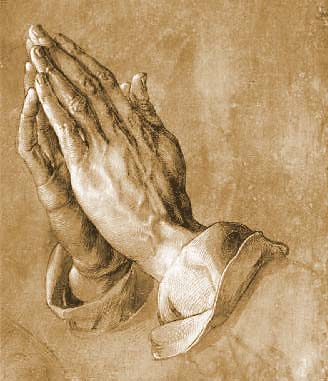 Prayer is, according to the Catechism of the Catholic Church [2744-2745], a vital necessity, indeed inseparable, from living the Christian life. It is through regular prayer that the Christian draws closer to God; in the Gospels we read of The Lord Jesus Christ going off by himself to pray, to be commune with his Father in heaven. St. Paul, writing to the Thessalonians urges them to pray constantly [1 Thessalonians 5: 17], praying to the Spirit on every possible occasion [Ephesians 6: 18], for it is only through the action of the Holy Spirit that the Christian is able to recognise Jesus as the Lord [1 Corinthians 12: 3] and it is through prayer that the faithful open themselves to the actions of the Spirit. St John Chrysostom states that, “It is possible to offer fervent prayer even while walking in public or strolling alone, or seated in your shop . . . while buying or selling . . . or even while cooking”. As well as urging the faithful to private prayer, the Catholic Church also summons its children to gather at regular intervals in communal acts of worship and adoration of God for this is the first virtue of religion as it acknowledges God as the Creator and Saviour, as the Lord and Master of all that exists, as infinite and merciful love personified. It is through adoring God that the Christian becomes humble [Catechism 2095-2097].
Prayer is, according to the Catechism of the Catholic Church [2744-2745], a vital necessity, indeed inseparable, from living the Christian life. It is through regular prayer that the Christian draws closer to God; in the Gospels we read of The Lord Jesus Christ going off by himself to pray, to be commune with his Father in heaven. St. Paul, writing to the Thessalonians urges them to pray constantly [1 Thessalonians 5: 17], praying to the Spirit on every possible occasion [Ephesians 6: 18], for it is only through the action of the Holy Spirit that the Christian is able to recognise Jesus as the Lord [1 Corinthians 12: 3] and it is through prayer that the faithful open themselves to the actions of the Spirit. St John Chrysostom states that, “It is possible to offer fervent prayer even while walking in public or strolling alone, or seated in your shop . . . while buying or selling . . . or even while cooking”. As well as urging the faithful to private prayer, the Catholic Church also summons its children to gather at regular intervals in communal acts of worship and adoration of God for this is the first virtue of religion as it acknowledges God as the Creator and Saviour, as the Lord and Master of all that exists, as infinite and merciful love personified. It is through adoring God that the Christian becomes humble [Catechism 2095-2097].
The Parish of the Immaculate Conception offers the faithful a number of ways in which they can partake in the communal worship of God. Of these the Sacrifice of the Mass offers the most perfect vehicle for the adoration of God, since the beginning to the present day it remains at the centre of the life of the Church [Catechism 1343]. The Parish of the Immaculate Conception is fortunate to be able to give the faithful the opportunity to participate in the Sacrifice of the Mass daily as well as on the Lord’s Day when, and on other holy days of obligation, the faithful are bound to participate in the Mass [Catechism 2180].
THE LITURGY OF THE CATHOLIC CHURCH.
Liturgy, the word comes from the Greek “leitougria”, “work of the people”, is the term given to the public and official prayers and rites of the Catholic Church. It is an activity of the whole Church, clergy and laity alike. Liturgical worship is a communal gesture of praise neither originating nor directed toward any one group or person. Instead it finds its source and goal in the common glorification of God whose saving works are accorded universal significance. It is through the celebration of its various liturgies, inspired by the Holy Spirit and reaching back across the centuries that the Church most visibly and publically expresses its Catholicity. In this, the communal celebration of and participation in the liturgy of the Church is the most important function that the lay faithful can perform.